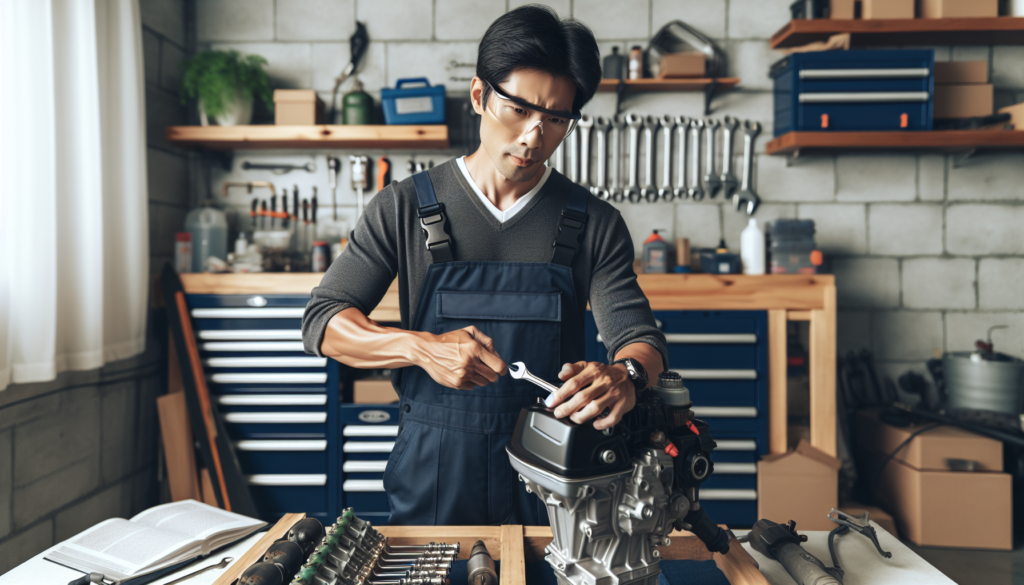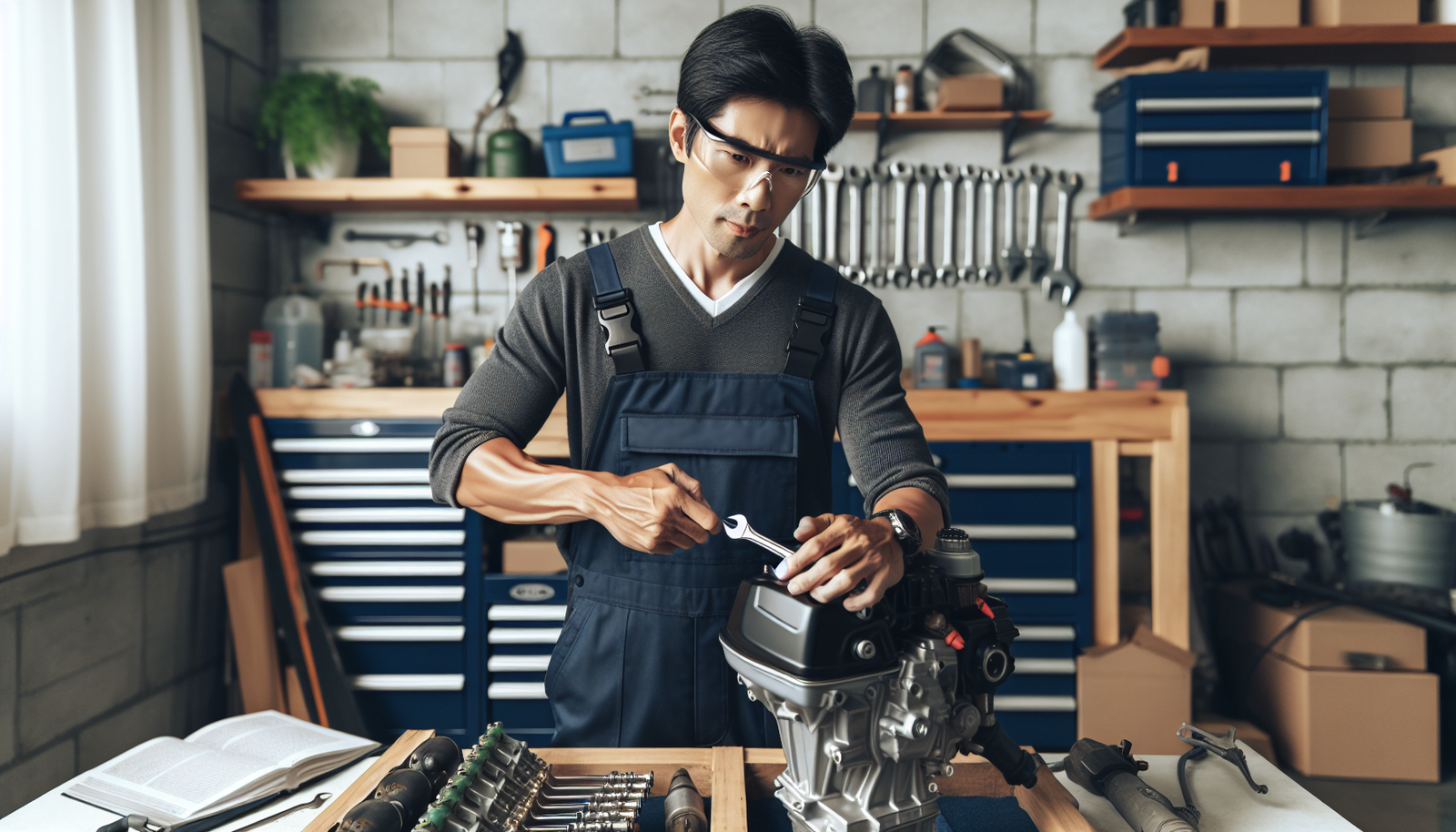Is this your first time owning a boat, or perhaps, you’re a seasoned sea traveler who just never really got around to learning the ropes of engine upkeep? Let’s face it, engine maintenance can seem like a complicated and daunting task, but it’s absolutely essential for ensuring your boat continues running smoothly. So, let’s take the mystery out of boat engine maintenance and share some essential tips that every beginner should know. Whether you’re the proud owner of a sleek new yacht or a trusty old fishing boat, these tips will help keep your engine humming and your boat sailing smoothly. So, folks, if you’re ready, let’s cast off into the world of boat engine maintenance!

Understanding the Basics of Boat Engine Maintenance
Just like with any other machine, boat engine maintenance is integral to its performance, longevity, and overall functioning. It’s crucial to keep in mind that taking care of your boat engine extends beyond simply changing the oil and fuel. There’s a lot more into it if you are to ensure your boat lasts longer and concurrently serves you optimally.
What entails boat engine maintenance
Boat engine maintenance is all about taking care of the various components of the engine and ensuring they are working at their best. This involves regular checking and changing of the engine oil, maintaining the cooling system, inspecting and replacing spark plugs, fuel system maintenance, battery maintenance, belt and hose inspections, propeller, and shaft checks and finally, winterizing your boat engine.
Importance of regular engine maintenance
Regular engine maintenance is crucial because it helps with identifying issues early before they escalate into bigger and more costly problems. Moreover, maintaining your engine will enhance its performance, ensuring you enjoy smooth and uninterrupted cruises. This will also extend your boat’s lifespan.
Types of boat engines and their maintenance needs
There are two main types of boat engines: outboard and inboard engines. Outboard engines are located outside the hull and offer better control during high speeds and maneuverability. On the other hand, inboard engines are installed inside the boat hull offering better balance and control in larger boats. While both require basic maintenance practices like oil changes and cooling system maintenance, they each have specific needs based on design and operation. It’s crucial to understand your boat engine for efficient maintenance.
Familiarizing With the Engine Components
Having a deep understanding of the different parts of your boat engine is the first step to efficient and effective maintenance.
Different parts of a boat engine
A boat engine is made up of various components including the carburetor, cooling system, engine oil system, spark plugs, propeller, shaft, belts, and hoses among others. Each of these components plays a crucial role in the functionality of the engine.
Understanding the function of each component
The carburetor for instance, controls how much air and fuel enter the engine cylinders. The cooling system keeps the engine from overheating while the oil system lubricates moving parts to reduce friction. Spark plugs ignite the air and fuel mixture in the cylinder to produce power while the propeller and shaft deliver that power to the water. Lastly, belts and hoses connect different parts of the engine for a seamless operation.
Identifying component issues or malfunctions
Knowing each component and understanding its functionality makes it easier to identify potential issues or malfunctions. For instance, if your engine is overheating, you can quickly suspect the cooling system. Similarly, if there’s excessive friction, you might need to inspect the oil system. The key is to understand the specific signs and symptoms that a component might be problematic and then act fast.
Checking and Changing the Engine Oil
Your boat engine oil can be likened to the lifeblood of the engine. It’s bound to get dirty and regularly needs to be checked and changed for the engine’s healthy functioning.
Importance of maintaining the right oil level
Maintaining the right oil level is crucial as it ensures all moving parts in the engine are adequately lubricated, thus reducing friction and wear. Low oil level may lead to increased friction causing engine parts to start wearing out or even seizing.
How to check the engine oil
To check the boat engine oil, you pull out the dipstick, wipe it clean, insert it back, and then pull it out again. The oil level should be between the ‘Full’ and ‘Add’ marks. Always check the oil while the boat is on a level surface to ensure an accurate reading.
When and how to change the engine oil
It is recommended to change your oil every 50-100 hours of use or at least once per year for recreational boating. You should start by warming up the engine for a few minutes, then use a pump to remove the old oil, and finally pour in the new oil. Always ensure not to overfill.
Choosing the right oil for your boat engine
The type of oil you use greatly impacts your engine’s performance. Its important to use marine engine oil and not automotive oil. Always check the manufacturer’s guidelines or consult with a professional when unsure.

Maintaining the Cooling System
The cooling system is a crucial part of the engine as it prevents the engine from overheating by dissipating heat reactions from the combustion process.
The role of the cooling system in a boat engine
The cooling system circulates coolant around the engine which absorbs heat and then keeps the engine temperature within safe limits.
Checking and maintaining the coolant level
You should regularly check your coolant reservoir to ensure it’s properly filled. Running your engine on low coolant can cause it to overheat which can result in engine damage. Anytime you notice the coolant level dropping too fast, that could indicate a leak in the cooling system which should be addressed immediately.
Flushing the cooling system
Over time, the coolant can get contaminated with rust, scale, and other debris, making it less effective. Regularly flushing your cooling system, at least once a year can help keep the cooling system in shape. Make sure to follow your manufacturer’s recommendations on how and when to flush your cooling system.
Potential issues with the cooling system and how to solve them
Apart from leaks, other cooling system issues could be a faulty thermostat, faulty water pump, or a blocked radiator. In such cases, replace the faulty parts and always ensure the regular maintenance of your cooling system to avoid these issues.
Inspecting and Replacing Spark Plugs
Spark plugs, though small, have a big job of igniting the fuel-air mixture which creates combustion, powering the engine.
Essential role of spark plugs
Spark plugs ignite the air-fuel mixture creating a spark that powers your engine. Any faults or malfunction in spark plugs will directly affect the performance of your engine.
How to inspect spark plugs
A visual inspection can tell a lot about your spark plugs. Look for signs like cracks in the porcelain insulator, electrode erosion, oil or carbon buildup; these are signs your spark plugs may need to be replaced.
Signs of worn-out spark plugs
Engine misfires, lack of acceleration, poor fuel economy, and difficulty in starting the engine are common signs of worn-out spark plugs.
Proper method of replacing spark plugs
When replacing spark plugs, first remove the old ones, clean the hole threads and then install the new ones. Make sure not to overtighten the new plugs as they could break.
Fuel System Maintenance
The fuel system, which includes the tank, pump, filter, and injectors, plays a crucial part in your engine’s performance.
Importance of fuel system maintenance
A properly maintained fuel system ensures that your engine gets the right amount of clean fuel for combustion. It helps in maintaining optimal engine performance, reducing emission levels and increasing the engine’s lifespan.
Checking and cleaning fuel filters
Fuel filters act as the gatekeepers to your engine; they stop any dirt or rust from getting into the engine. Checking and cleaning the fuel filters is relatively simple and can save you from a lot of engine trouble. If the filters are too dirty, they should be replaced.
Using fuel stabilizers
Rubber, plastics, and other materials in the fuel system can degrade over time due to oxidation, and heat. Fuel stabilizers can preserve your fuel and protect the engine from these potential problems.
Issues related to ethanol in fuels
Ethanol can cause corrosion of fuel system components, clog of fuel filters, and degrade the engine’s performance. Using fuels with 10% ethanol or less can help protect your boat engine from ethanol-related issues.
Battery Maintenance
The battery powers the electrical system of your boat, making it a vital component of your vessel.
Understanding marine batteries
Marine batteries are more robust than car batteries, as they are designed to withstand harsh marine conditions. They require routine checking and maintenance to keep them working optimally.
Checking and cleaning battery terminals
Battery terminals can corrode over time, affecting their power output. Regularly check for signs of corrosion, and clean the terminals using a battery cleaning solution to maintain power efficiency.
Proper battery charging practices
Overcharging or undercharging your battery can shorten its lifespan. It’s vital to adhere to the manufacturer’s charging guidelines for efficient battery operation.
Replacing boat engine batteries
With proper care, marine batteries can last for years. However, if they start losing charge quickly or fail to start the engine, it’s time to replace them.
Belt and Hose Inspections
Belts and hoses connect various parts of your engine together, facilitating a smooth operation.
Roles of belts and hoses in boat engines
Belts transmit power from the engine to other boat components like alternators. Hoses carry fluids like coolant, fuel, or oil to different parts of the engine.
How to check for belt and hose wear
Regularly check belts for signs of wear like cracks or stretching. For hoses, look for cracks, leaks, or soft spots. Ensure all clamps are tight and hose attachments are secured.
Changing belts and hoses
If you notice signs of wear or damage on your belts or hoses, it is recommended they are replaced. Although, depending on the boat usage, belts and hoses should generally be replaced every 3-5 years.
Propeller and Shaft Checks
The propeller and shaft transfer the engine power into water propulsion, making them a vital part of your boat.
Importance of the propeller and shaft
A damaged propeller or shaft can drastically reduce your boat speed and put added stress on your engine.
Routine checks on the propeller and shaft
A regular visual check of your propeller for nicks, dents, or other damages is essential. Also, ensure the shaft is straight and free from corrosion.
Fixing issues with the propeller and shaft
If you notice any signs of damage on them, consider replacing or repairing the propeller or shaft immediately to maintain optimal engine performance.
Winterizing Your Boat Engine
Winterizing is the process of preparing your boat for the winter season to protect it from freeze damage.
What is winterizing
Winterizing involves draining the cooling system, adding antifreeze, stabilizing the fuel, changing the oil, and removing the battery among others.
Steps in winterizing a boat engine
Winterizing your boat engine involves several steps. Start by thoroughly cleaning your boat, inside and out. Next, drain the fuel system or add a fuel stabilizer. Change the engine oil and replace the oil filter. Drain the coolant from the engine, then add antifreeze. Lastly, remove the battery and store it in a warm place.
Importance of winterizing for engine longevity
Winterizing your boat engine protects it from cold weather damages like freezing and cracking. It can also prevent corrosion and other damage caused by long periods of inactivity, thus prolonging your engine’s lifespan.

